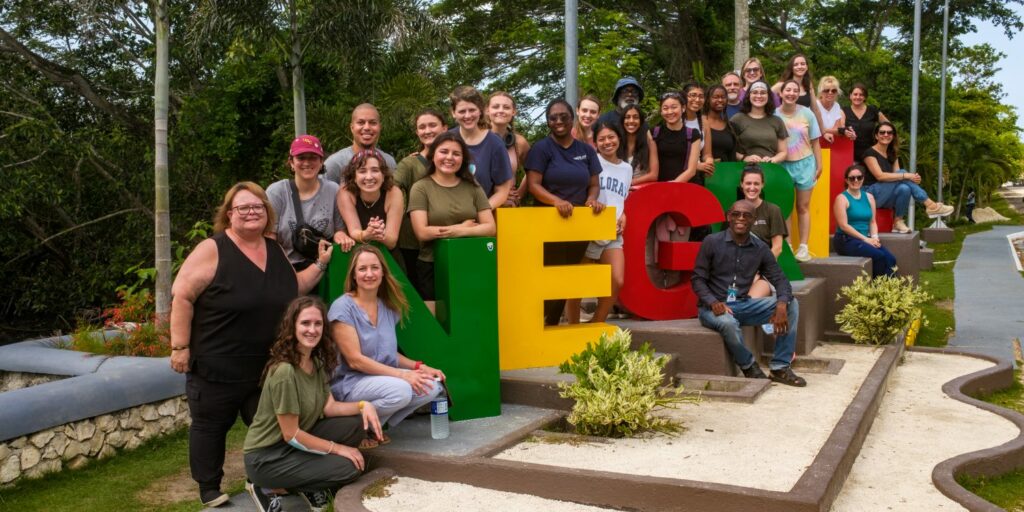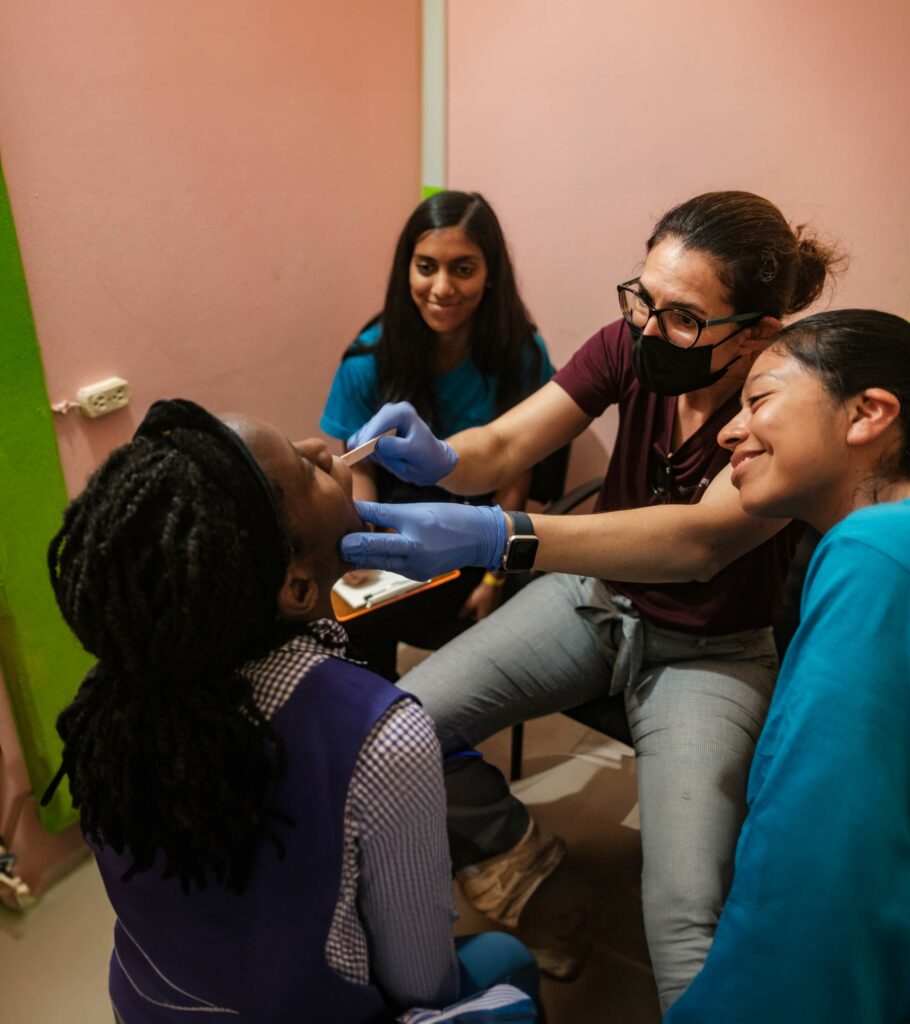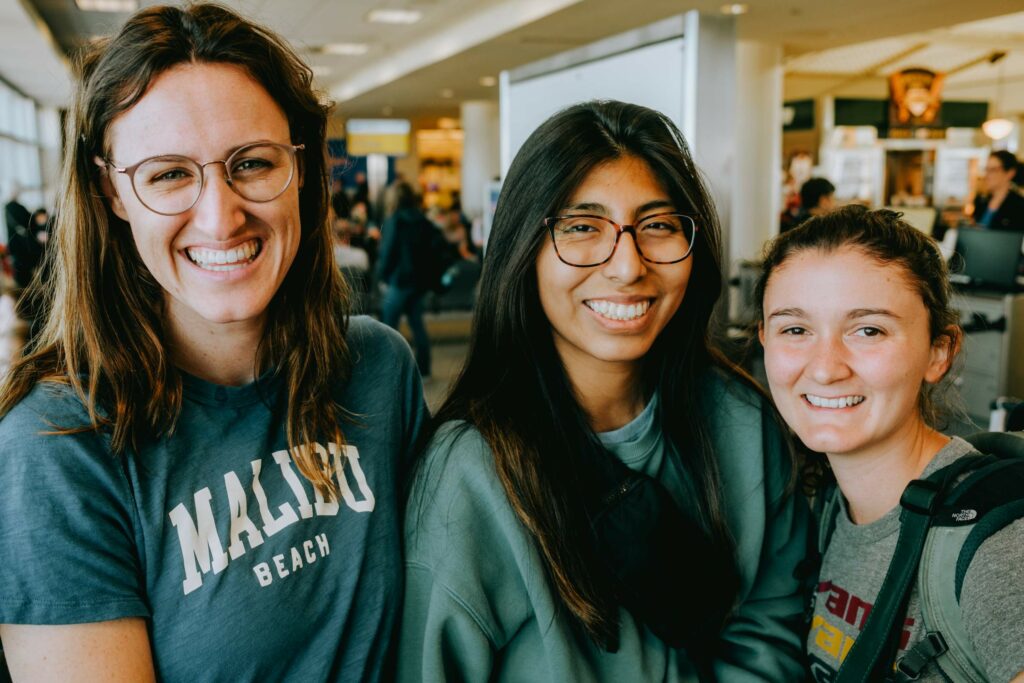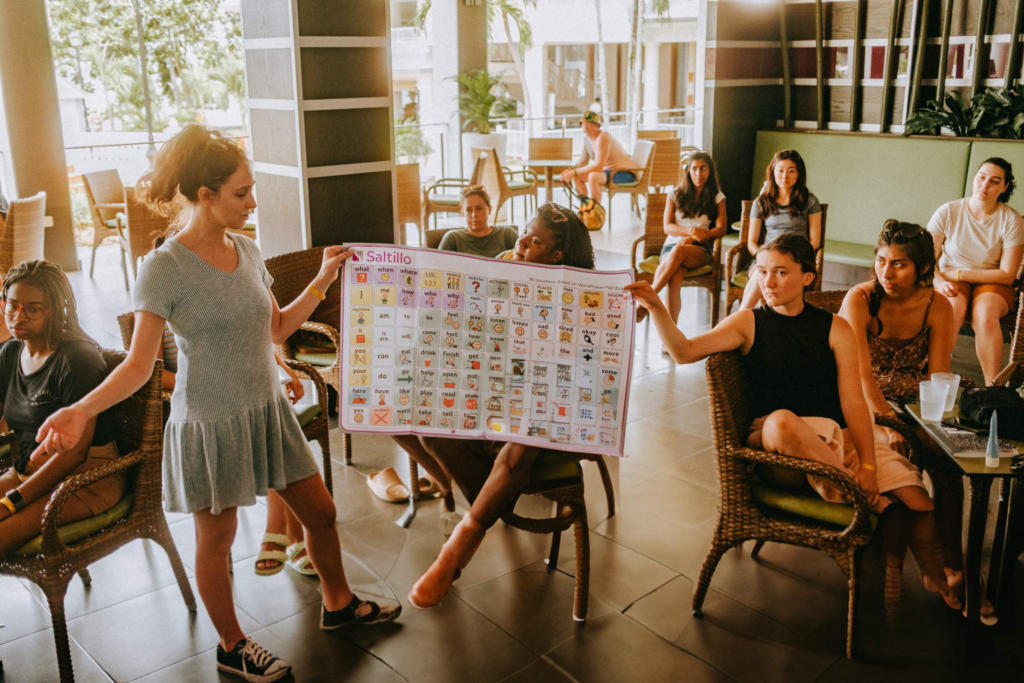Making a Difference, One Voice at a Time
Andrews University School of Communication Sciences & Disorders takes a mission trip to Jamaica
September 3, 2024 | Berrien Springs, Michigan, United States | Kaara Harris, Lake Union Herald
A group of students and faculty from the Andrews University School of Communication Sciences & Disorders (SCSD) took their first international service trip to Jamaica this year, from May 30 to June 14.
The team of 31 health-care professionals and speech-language pathology graduate students from the university in Berrien Springs, Michigan, United States, provided much-needed speech, language, cognitive, swallowing, and hearing services to more than 200 students from the Llandilo School of Special Education.

A group of students and faculty from the Andrews University School of Communication Sciences & Disorders took their first international service trip to Jamaica to support people with disabilities. [Photo: Andrews University]
The idea for the trip began in 2019, when Heather Ferguson, former chair of SCSD and associate professor, met the then assistant principal of the Llandilo schools during a visit to the island.
“My parents were both Jamaican nationals … and I felt like if I wanted to be able to give back and serve somewhere, I really wanted it to be there,” Ferguson said.
The Need
Ferguson, now an associate provost of undergraduate and graduate education at AdventHealth University in Florida, learned there was a dire need for resources in Jamaica. Families with children who have speech-language disorders lack consistent, affordable access.
“What we would call support services, like speech and language services, … physical therapy, occupational therapy, and behavioral therapy for autism, those are all ‘private pay’ there,” she said. “And with poverty being what it is, most people can’t afford it.”

The Andrews University team serving a sc student. [Photo: Andrews University]
Approximately 15 percent of Jamaicans are living with a disability, according to government estimates. A lack of specialized educational resources, particularly for those in rural areas, can have a negative impact, according to The Borgen Project.
“If a child has these disorders and is not able to communicate or understand, there’s a high level of frustration,” Brynja Davis, AU assistant professor of speech-language pathology, said. Lack of engagement may mean students play games or sleep all day in class, Davis added.
“Another sad outcome is learned helplessness,” Sue Mondak, associate professor and on-site clinical director, said. “They just give up trying to communicate.”
Educators, families, and children are making do. And that’s where the group from SCSD sought to help.
How They Served
The group split into teams for eight days of service at the Llandilo sites — the school’s main campus, the Lucea Centre, and the Montego Bay Learning Centre.
The teams screened for language, articulation, voice, swallowing, and basic communication to get a baseline of what children and young people, from birth to 21 years, could and could not do. They also worked with teachers in their classrooms to model ways to facilitate or elicit communication.

Three of the team members who participated in the Andrews University mission trip to Jamaica. [Photo: Andrews University]
“We took a parachute, and [the children] loved the parachute,” Shilling said. “They taught us how to play cricket. They love to dance. They love music. One of our girls brought a ukulele and, oh, the kids loved that.”
When they weren’t at the sites helping children and teachers, the group members participated in local church services on Saturday (Sabbath).
Challenges
As the group began screenings, however, team members realized they were in for more than they had anticipated, with many non-speaking, nonverbal students, Ferguson said. To address the immediate need, they utilized apps on tablets and created and printed communication boards in their hotel rooms to supplement the materials they’d brought. The team also encountered a broader range of disorders and more severe diagnoses than they had expected.
“We warned our students to be flexible,” Mondak said. While she worked with early intervention, or ages birth to 5 years, at the Montego Bay site, she also met older students with severe cerebral palsy and nonverbal autism, who had never been seen by occupational or physical therapists (a common intervention in the US), making their screening difficult.
The group also had to contend with closures due to conditions beyond their control, including flooding and a taxi strike, which meant there were days when only a handful of students showed up. The long commute, pace of work, and heat also took a toll, leading to sickness among the team members.

Students and faculty from the Andrews University School of Communication Sciences & Disorders sought ways to support people with speech disabilities in Jamaica. [Photo: Andrews University]
Despite the challenges, the group saw God move in various ways during the service trip.
On their way home on the bus from the Llandilo campus one afternoon, Mondak said, “All of a sudden we heard a pop, then a thud, and we all knew this was not good.” Their driver pulled over and saw a flat tire. They searched for a repair shop but kept encountering the same problem — the bus was too big, and the shops didn’t have the tools to fix or replace the tire. As they neared the Lucea school, the driver, who was also a pastor, saw a man he knew sitting on the side of the road. “He says, ‘I have a truck and a jack. I can lift your bus and help you change your tire,’ ” Mondak recalled. The driver accompanied the group to the Lucea school, where they waited until the repair was done.
“This was a miracle, because there were about 20 of us on the bus. We would’ve had to exit on the side of the road, in 90-degree weather, 100 percent humidity … not the safest [option]. So, God brought this man the pastor knew and so close to the school,” Mondak said. They were even able to help the children at the Lucea site while waiting. “That was a blessing. God protected, and God blessed.”
At another time, during a hearing loss screening, Rhonda Tomenko, assistant professor of audiology, turned on her equipment and got a “pump error” message, which she’d never seen before. Tomenko and her student assistant frantically tried to get the machine working again. They searched online for instructions, replaced the batteries, and restarted the machine. Nothing worked.
“Finally, I’m like, why am I not just praying about this? So, I just quickly say, ‘God, please, we need this to work. Please let this work.’ And the next second, it’s on the test screen and it’s ready to test.’ And I’m like … ‘Thank You so much because we need this to work today,’ ” Tomenko said.
On the last day of the trip, the SCSD group held a workshop on several topics. Open to educators, administrators, and parents of children with special needs, more than 100 people attended and eagerly received the presentations.
A Unique Opportunity
The entire current graduate student cohort went on the trip, not wanting to miss the chance to work with a unique population.
For Brianna Back, the trip highlighted what drew her to the field. “I’ve seen what a community can look like when they don’t have support and education for parents and families. And I’ve seen how that can affect their kids. Here in the US, we do have so much support.… So, to have the opportunity to go to a place where they don’t have those resources … maybe we can get the attention of other people who can set up something permanent for them.”
Reception
From the in-school screenings to the informational workshop, the response from the community was positive. Parents were particularly appreciative, Mondak said. “They were willing to come however many miles and wait however long with their little kids in the heat. They were so grateful for any information, [asking] ‘Will you keep sending us info until you come back next year?’ ”
The students and educators were receptive as well. “What stood out for me was how quickly our students formed connections with those students. The kids just fell in love with our students,” Ferguson said. “The teachers were really quickly trusting of the team, and they were just so open!”
What’s Next?
Two weeks of help won’t remedy the lack of services for these children, but the SCSD group believes the trip has planted seeds that will bear fruit.
“This is something that we went into with the hopes of sustainability,” Ferguson said. “Being able to go back and build on what we just started,” including developing training modules where teachers can learn about a specific topic.
“They’ve already asked us, ‘Are you coming back and when?’ ” Shilling said.
SCSD staff are discussing plans to return, shaped by what they’ve learned from this trip, including potentially working with other university departments for additional support.
For now, the group is thankful for a successful trip where they were able to help underserved students, overextended teachers, and grateful parents.
“It just made you so happy to know that you’ve made a difference for someone,” Tomenko said.
The original version of this story was posted by the Lake Union Herald.